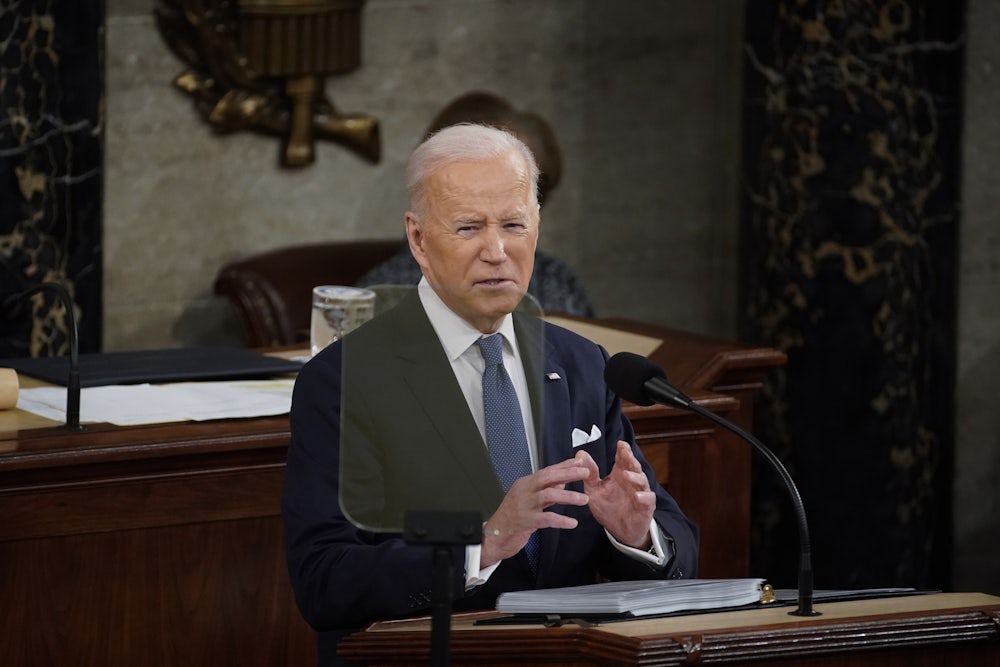At some point Tuesday night, Joe Biden will pause, take a breath, narrow his eyes and fix them on the camera, and say in his best stentorian voice, “The state of the union is strong.” Democrats will leap to their feet and offer him a standing ovation that they’ll hold, as members of the president’s party always do, for several seconds longer than normal decorum demands. Republicans will do their best to look unruffled and bored.
In certain ways, the state of the union is pretty strong. Last Friday’s jobs report was a huge jolt for the economy. Inflation is slowing (the next numbers will be released on February 14). America is being rebuilt, thanks to the infrastructure act. Over in Europe, they’re grousing that the Inflation Reduction Act is forcing them to invest more in the greening of their own economies. This is a good competition, though—a race to the top, rather than the bottom, initiated by the United States of America!
And yet … by other measures, the state of the union is precarious. We took a step back from the “so long, democracy!” cliff last November, when the major MAGA candidates (with one pathetic exception) lost and accepted the result. But the Republican Party remains strong—far stronger than a plainly anti-democracy party deserves to be in a democracy. But as someone said a couple years ago of a different crisis: It is what it is.
This anti-democracy party poses three threats to the republic, and we won’t know until the next election, 21 months away, whether a majority of the American people see those threats for what they are and resolve to arrest their progress. Those threats are Trumpism, minority rule, and ethnonationalism. All are direct assaults on democratic rule. If we the people stop them next November, we’ll be on our way to restoring the democratic health of the nation. But if not …
Let’s assess the threats in order.
Trumpism. Donald Trump’s presidential campaign is in second gear at best for one simple reason: It is impossible for him in 2023 and 2024 to package himself politically in the same way he did in 2015 and 2016. You can only be a fresh face once. America didn’t know Trump then. Now we do. America can’t unsee January 6. The percentage of swing voters who’ll buy his act in 2024 if he’s the nominee is far smaller than it was in 2016.
When I say to my friends that I want Trump to be the GOP nominee, some respond in horror, “Yeah, we thought that in 2016 too.” Yes, we did, and we were wrong. But the circumstances have changed dramatically. They’re even different from the 2020 election. He tried to overthrow the government. He wanted people to kill his own vice president. A distressing number of Americans cheered all this. But a clear majority do not.
Still—he could be the nominee. Those already writing him off are being premature. If we assume that he has his 30 percent or so, well, 30 percent wins a lot of primaries in a multicandidate field. And the way GOP primaries are organized—many are winner-take-all or winner-take-all by congressional district—he can haul in a lot of delegates.
Can he win the election if he’s the nominee? Nothing’s impossible, but it’s highly doubtful. More frightening is the scenario under which he loses narrowly but steals victory away from the Democrat. This too is improbable—the gubernatorial candidates in key swing states who would have enabled such a theft all lost. But Republicans still hold majorities in some of those state legislatures, and they control the elections machinery in some of those states. And the MAGA people have a lot of guns.
I’m well aware that it’s playing with fire to hope that Trump is the nominee. But he’s clearly the least likely Republican to win. And if he loses resoundingly enough that he can’t challenge the results, then he is done. I would not go so far as to say that the Republican Party will reject Trumpism. I thought after 2012 that the party might follow Reince Priebus’s autopsy and moderate its views on certain matters. It did the opposite. But at least the lying fascist will be retired from public life, and with any luck, in prison.
Minority rule. This conviction among Republicans predates Trump and will survive him: They know very well that most of their views and positions are unpopular and could never win majority support, from opposition to abortion rights to background checks to tax cuts for the rich and so much more, so they have resolved to achieve these goals through minority rule. The means are well known: aggressive gerrymandering, voter suppression, a stacked Supreme Court with justices elevated by senators representing a minority of the population, and more.
All that, and just general lying about what they stand for. Mike Pence, in floating his hopeless presidential candidacy last week, said of Social Security: “I think the day could come when we could replace the New Deal with a better deal. Literally give younger Americans the ability to take a portion of their Social Security withholdings and put that into a private savings account.” This is nonsense. The right hates Social Security because it’s a massive state program, and it’s successful, and people love it.
What do we do about minority rule? It’s a tough one. As I said, it predated Trump and will outlast him. A great first step will be eliminating the filibuster. My dream for January 20, 2025, is this. Joe Biden is sworn in for his second term. The Democrats have recaptured the House and, through some miracle, held their Senate majority and expanded it to 53. They chuck the filibuster, and they just start passing stuff, all of which can pass via simple majority and without having to go through the contortions of reconciliation: voting rights; higher minimum wage indexed to inflation; Medicare expansion; rural broadband; free insulin (yes, it’s doable and wouldn’t even cost that much); a tax on Big Pharma companies to finance opioid treatment centers; anti-monopoly laws; patent reform; more green-economy measures; and so on. They could make FDR look like he was napping on the job during those Hundred Days. All these things would be popular and would prove to voters that Washington can work—when it’s under the full control of a party that actually wants to improve their economic well-being.
Ethnonationalism. Most Americans may not call themselves liberals, but operationally, they want what we liberals want: a multiracial democracy in which discrimination is minimized and everyone has a more or less equal chance to fulfill her or his potential.
A sizeable minority, of course, wants multiracial democracy’s opposite. They want a basically white ethnonationalist Christian state. They’re quite open about it. A Pentecostal pastor told an audience at a Mike Flynn Turning Point USA rally last fall, “I’ve come here to declare war on every demonic, demon-possessed Democrat that comes from the gates of hell.” That’s … not exactly in the spirit of the Founders’ dream that in a democracy, reasonable people could reason together.
Ethnonationalism is democracy’s opposite. Ethnonationalism is Putin’s Russia, Orbán’s Hungary, Erdogan’s Turkey, Bolsonaro’s Brazil, Xi’s China, Milošević’s Serbia, and, yes, in its most extreme form, Hitler’s Germany. And it’s Trump’s America, but not just Trump’s: There are thousands, maybe even millions, of people out there like that Pentecostal preacher. This urge too will outlast Donald Trump, but it can be marginalized and defeated if the proponents of multiracial democracy show the waffling portion of the population that multiracial democracy delivers the greatest good for the greatest number.
At his State of the Union address, Joe Biden is unlikely to address these three points specifically. What he will do is boast about the economy. I hope he’ll boast about it in a particular way—by saying that the economic indicators vindicate his “middle-out, bottom-up” economic theory (which I wrote about in the book I released last fall), and that the old Republican free market uber alles theory is failed and dead. I hope he’ll make a stout defense of his support for Ukraine as he stares directly at the ethnonationalists in the House (and a few in the Senate) who make apologies for Putin and want to cut off aid to Kyiv. I hope he speaks emphatically about the depravity of police officers who dishonor their badges as those five Memphis cops did. And I hope he shames the idiots who think, in this blood-splattered land, that wearing an AR-15 lapel pin is funny.
If he does those things, he will be making an indirect attack on Trumpism, minority rule, and ethnonationalism, because he’ll be defending the best values to which our nation aspires—and showing the proof, in dollars and cents, that his brand of politics can yield jobs, dignity, and security. But it’s one thing to talk about values and accomplishments. He, and we, must use them to win at the ballot box. We will know a lot more about the state of our union after November 5, 2024.










